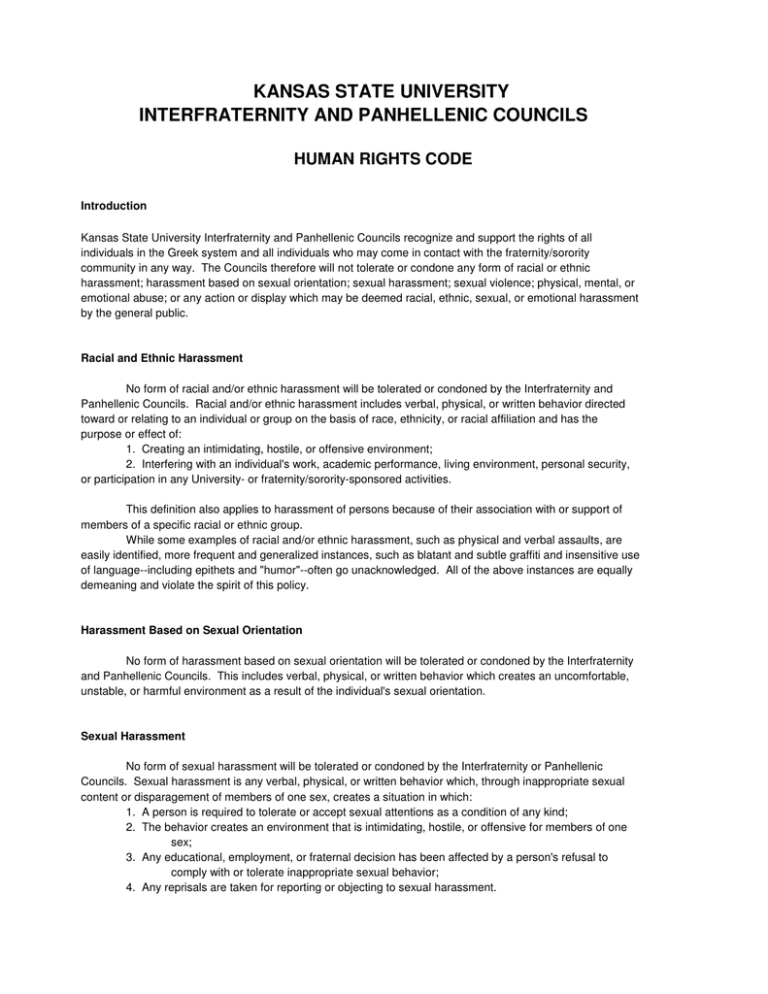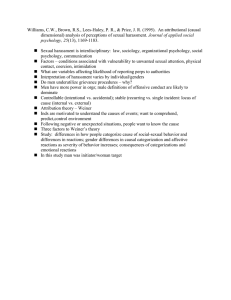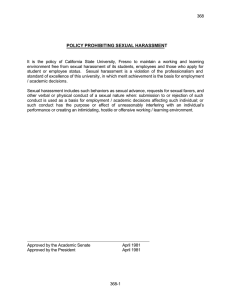
KANSAS STATE UNIVERSITY
INTERFRATERNITY AND PANHELLENIC COUNCILS
HUMAN RIGHTS CODE
Introduction
Kansas State University Interfraternity and Panhellenic Councils recognize and support the rights of all
individuals in the Greek system and all individuals who may come in contact with the fraternity/sorority
community in any way. The Councils therefore will not tolerate or condone any form of racial or ethnic
harassment; harassment based on sexual orientation; sexual harassment; sexual violence; physical, mental, or
emotional abuse; or any action or display which may be deemed racial, ethnic, sexual, or emotional harassment
by the general public.
Racial and Ethnic Harassment
No form of racial and/or ethnic harassment will be tolerated or condoned by the Interfraternity and
Panhellenic Councils. Racial and/or ethnic harassment includes verbal, physical, or written behavior directed
toward or relating to an individual or group on the basis of race, ethnicity, or racial affiliation and has the
purpose or effect of:
1. Creating an intimidating, hostile, or offensive environment;
2. Interfering with an individual's work, academic performance, living environment, personal security,
or participation in any University- or fraternity/sorority-sponsored activities.
This definition also applies to harassment of persons because of their association with or support of
members of a specific racial or ethnic group.
While some examples of racial and/or ethnic harassment, such as physical and verbal assaults, are
easily identified, more frequent and generalized instances, such as blatant and subtle graffiti and insensitive use
of language--including epithets and "humor"--often go unacknowledged. All of the above instances are equally
demeaning and violate the spirit of this policy.
Harassment Based on Sexual Orientation
No form of harassment based on sexual orientation will be tolerated or condoned by the Interfraternity
and Panhellenic Councils. This includes verbal, physical, or written behavior which creates an uncomfortable,
unstable, or harmful environment as a result of the individual's sexual orientation.
Sexual Harassment
No form of sexual harassment will be tolerated or condoned by the Interfraternity or Panhellenic
Councils. Sexual harassment is any verbal, physical, or written behavior which, through inappropriate sexual
content or disparagement of members of one sex, creates a situation in which:
1. A person is required to tolerate or accept sexual attentions as a condition of any kind;
2. The behavior creates an environment that is intimidating, hostile, or offensive for members of one
sex;
3. Any educational, employment, or fraternal decision has been affected by a person's refusal to
comply with or tolerate inappropriate sexual behavior;
4. Any reprisals are taken for reporting or objecting to sexual harassment.
In the past, sexual harassment has sometimes been tolerated because of the mistaken notion that
sexual attentions and advances are always complimentary or flattering. Jokes, slurs, disparagements, or insults
directed at members of one sex, often sexual in content, have frequently been dismissed as harmless humor.
However, such behavior can interfere with an individual's rights. Sexual harassment is prohibited not because it
is sexual, but because it is harassment and a form of discrimination.
Sexual Violence
No form of sexual violence will be tolerated or condoned by the Interfraternity or Panhellenic Councils.
This policy thus prohibits not only those acts commonly understood to constitute "sexual assault," but all
attempts to coerce sexual activity as well.
This policy prohibits acts only when they are forced on another person. An act is forced if the victim
refuses, or when the victim does not verbally or otherwise indicate refusal but:
1. Is overcome by force or fear;
2. Is unconscious or physically powerless;
3. Is incapable of refusing because of mental deficiency or disease, or;
4. Is incapable of refusing because of the effects of alcohol, narcotics, drugs or any other substances.
Victims of sexual violence will be encouraged and assisted to seek redress to whatever extent they desire
through the relevant laws of society.
Human Respect
The Interfraternity and Panhellenic Councils will not tolerate or condone any abuse of a physical,
mental, or emotional nature. Physical abuse is defined to be any action or situation which causes pain, injury,
or physical harm. Any action or situation which causes ridicule, harassment, discomfort, or fright to such an
extent that mental or emotional harm is incurred will be considered abusive.
Public Actions and Displays
The Interfraternity and Panhellenic Councils realize that our fraternity system does not live in a vacuum,
but must recognize and be sensitive to persons in our university and community. Therefore, the Councils will
not tolerate or condone any action or display which may be considered offensive or obscene, in that it creates
racial, ethnic, sexual, emotional or other harassment or abuse.
General Guidelines
Any action, situation, or display by a member fraternity/sorority, or any action, situation, or display
which may be considered to be endorsed by a member fraternity/sorority, and is in violation of any section of
this policy, will be considered a violation of this Human Rights Code. This will apply whether the action,
situation, or display involves only fraternity/sorority members, or members of the larger community.
Any person (pledge/associate member, active member, guest, alumni/ae, university faculty/staff
member) suffering or witnessing a violation of this policy must report the incident(s) to appropriate Greek
Affairs officials.
This intentions of this policy are understood to be in accordance with the policies of Kansas State
University regarding racial/ethnic harassment, sexual harassment, and sexual violence.
Any complaint of a violation of this policy brought to the attention of the Interfraternity or Panhellenic
Council will be heard by the entire body of the Council. All parties in question will be allowed to present
information according to the hearing process for all Greek Affairs policies.
If a member chapter is found to be in violation of this policy, the body of the Council will have the
freedom to apply whatever punishment is deemed appropriate according to the violation, including education,
probation, fines, suspension, and withdrawal of university recognition.
Adopted 3/18/91
Revised 4/25/94
Revised 4/24/95
Last Reaffirmed: 4/25/05




